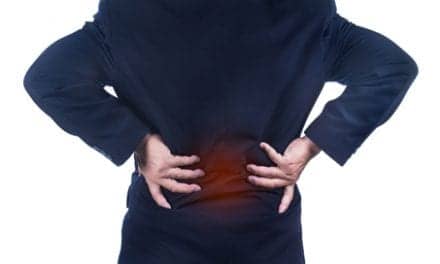Researchers from Germany report a possible association between patients with hip pain and their tendency to be older, obese, and depressed, compared to people with no hip pain.
Gender and social status were not associated with this pain, they add.
The study, conducted by Martin Schwarze, DrMed, of Heidelberg University Hospital, and colleagues, and published in Musculoskeletal Care, included 2,515 German adults 14 years old and above, 4.9% of whom reported chronic hip pain and an additional 1.5% who reported chronic hip pain that was disabling. Hip pain affected 1-5 sites in 47%, and was widespread (6-19 sites) in 50% of the participants.
Obesity and increased values on a depression scale were associated with a 2.55-times and 8.53-times higher likelihood of chronic hip pain, respectively, compared with individuals without pain. Increased values on the depression scale also increased the likelihood of experiencing disabling chronic hip pain, according to a media release from Wiley.
“Our results support the recommendation of previous researchers, that additional diagnostic studies should be performed for patients who experience chronic hip pain, particularly when there is a discrepancy between subjective pain levels and objective functional limitations,” Schwarze and colleagues state, explaining that evaluating psychological health status in people with chronic pain can sometimes pinpoint comorbid mental factors, which can lead to a more effective treatment plan.
“The intensity of pain experienced from the hip joint, and particularly the functional limitations that ensue, are influenced not only by the pathological changes in the joint, but also by psychological cofactors such as fear, depression and catastrophizing,” they add, in a separate release from Medpage Today.
In the study, the participants were administered questionnaires regarding pain, with chronic hip pain defined as pain that occurred within the past 7 days and persisted over the previous 3 months. Disabling hip pain was defined according to a separate questionnaire that assessed five functionality areas, including physical, emotion, cognitive, social, and daily activity functioning. Depressive symptoms were assessed using the Beck Depression Inventory for Primary Care questionnaire.
In the cohort, nine reported acute hip pain, 124 chronic pain, and 39 disabling chronic pain, for a total of 172 (6.9%) participants who experienced some type and severity of hip pain, the authors note.
They reported a “satisfactory” response rate of 57% in the study, but pointed out that “we could not exclude a selection bias towards participants who experience pain being consequently more motivated to complete the questionnaire.” Also, the cross-sectional design could not show causality between the assessed risk factors and hip pain.
“Our results for depressive disorder showed a stronger association with hip pain than our results for obesity,” the authors continue, in Medpage Today. They suggested that future studies should specifically look at when, and to what extent, depressive symptomatology may influence the decision to undergo primary total hip arthroplasty in this population. Future research should also look at the clinical outcomes following psychological screening among patients with hip pain.
[Source(s): Wiley, Medpage Today]





